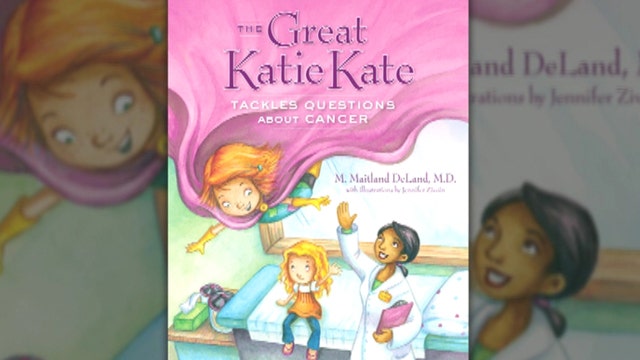Superhero helps kids deal with cancer
When a child is diagnosed with an illness, they’re thrust into a world of doctor’s appointments and tests. A cancer doctor who has been treating children for 30 years has written ‘The Great Katie Kate Tackles Questions About Cancer’ to help ease anxiety and fear
When a child is diagnosed with an illness, they’re thrust into an adult world of doctor’s appointments and tests.
Fox News’ Laura Ingle recently sat down with radiation oncologist Dr. Maitland DeLand, who has been treating children with cancer for more than 30 years. Now, she’s written a book, The Great Katie Kate Tackles Questions About Cancer to help children deal with the anxiety and confusion of a cancer diagnosis.
In her book, the main character is a child with cancer who acts as a superhero. She takes another child who is waiting on cancer test results through all the steps of treatment in a simple, but non-sugar-coated way to help the child understand the process.
DeLand, president and CEO of OncoLogics, said usually the most difficult part of pediatric cancer is trying to help the child understand what cancer is.
“I think a child really doesn’t understand what cancer means, like, ‘What is this going on in my body?’ And children, like adults, want to have control,” DeLand told FoxNews.com. “They want to have a sense of understanding, and for each, their journey is unique.”
Another challenging element of coping with cancer in children is dealing with family dynamics. DeLand said miscommunication can be a major problem. For example, if the child is hearing different things about their disease from their grandparent or uncle, it can be very confusing. She said all adults involved need to be on the same page.
“Well a cancer diagnosis just knocks parents over, and they want to know, what are the best options, and they want to communicate with their child just as they always have,’ DeLand said. “And it’s very difficult, communication breaks down.”
That’s why DeLand said in her experience, simplicity works best for both children and parents. Caregivers can sit down and read the book and everyone will have a basic understanding.
According to the National Cancer Institute, approximately 10,400 children under age 15 were diagnosed with cancer in the United States in 2007 and about 1,545 children will die from the disease. Although this makes cancer the leading cause of death by disease among U.S. children 1 to 14 years of age, cancer is still relatively rare in this age group. On average, one to two children develop the disease each year for every 10,000 children in the United States.
Although the causes of childhood cancers are largely unknown, a few conditions, like specific chromosomal and genetic abnormalities, and radiation exposure, can explain a small percentage of cases.
For parents, DeLand said the most important thing is to not let the child know that you’re scared.
For more information about ‘The Great Katie Kate’ visit DeLandBooks.com.

